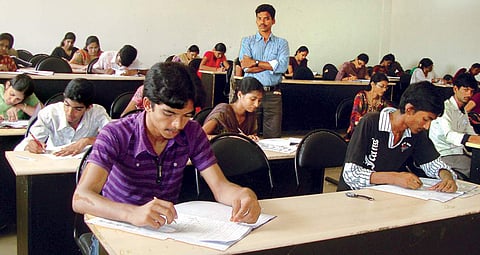

As final exams approach, Class X students face the daunting task of writing several exams over a period of six months. Mid-terms, mock examinations, Board examinations and entrance tests, not to mention the coaching for national-level exams that they will have to take two years later.
Constant stress from back-to-back examinations takes its toll on students, both physically and mentally. Cases of suicide and depression are also reported among this age group around this time of year. One parent, on condition of anonymity, told TNIE that the need to score better and compete with peers has increased pressure on their child. “In my school days, there was less pressure to score marks in schools. An average of 70% marks was considered an achievement at that time. However, now there is more pressure to perform better, not only for the sake of looking better in front of friends but also to get into a better institution and ensure a good future,” the parent said.
Dr Bhavit Bansal, who works with the Child and Psychiatry Department at the National Institute of Mental Health and Neurosciences (NIMHANS), said that the importance given to technology in the current education system has negatively impacted students, increasing their stress. “Students are naturally inclined towards more media consumption, especially visual media. This eventually leads to visual fatigue for the child. This, combined with examinations, where they study for hours at a stretch, coupled with increased late nights, can have a negative effect on them,” he told TNIE.
When entrance examinations were introduced
He said both teachers and parents need to be trained on how to reduce stress among students. “Adequate training should be given not only to teachers but also parents, as they are the caregivers. If students notice that parents are panicking, this will inevitably cause panic among them too,” he said.
Meanwhile, highlighting the socio-cultural impact of the issue, a parent and prominent filmmaker, Kesari Haravoo, said that the introduction of entrance examinations at the PU level increases the class divide among students. “Examinations do not define the learning process. Students, especially from rural areas, come from families where they are either first-generation or second-generation students. These students are at a greater disadvantage compared to students coming from the better strata of society. Getting high marks means a better seat and lower fees, while lower marks mean a regular seat and higher fees. This negatively impacts students who cannot afford to get extra coaching or have access to additional training from different sources,” he told TNIE.
